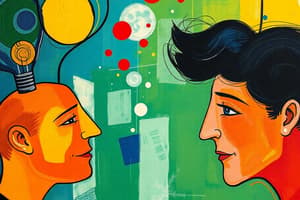Podcast
Questions and Answers
Which of the following is NOT a social factor that affects people's lifestyle and well-being?
Which of the following is NOT a social factor that affects people's lifestyle and well-being?
- Personal values (correct)
- Economic conditions
- Political climate
- Cultural norms
Which type of behavior is characterized by outward actions that can be directly observed, such as physical movements and verbal statements?
Which type of behavior is characterized by outward actions that can be directly observed, such as physical movements and verbal statements?
- Operant behavior
- Overt behavior (correct)
- Covert behavior
- Cognitive behavior
Which of the following is NOT a component of the ABC Model of Attitude?
Which of the following is NOT a component of the ABC Model of Attitude?
- Stimulus (correct)
- Affect
- Behavior
- Cognition
Which of the following is an example of covert behavior?
Which of the following is an example of covert behavior?
Which of the following learning methods involves modifying behavior through the use of rewards and punishments?
Which of the following learning methods involves modifying behavior through the use of rewards and punishments?
Which of the following best describes the relationship between attitude and behavior?
Which of the following best describes the relationship between attitude and behavior?
What is the main idea about 'feeling' in the content?
What is the main idea about 'feeling' in the content?
According to the provided information, which stage of development primarily focuses on establishing a sense of self-control and productivity?
According to the provided information, which stage of development primarily focuses on establishing a sense of self-control and productivity?
Which stage of development is associated with an influential figure described as 'community'?
Which stage of development is associated with an influential figure described as 'community'?
Which stage of development is associated with a potential unfavorable result of 'shallow involvement'?
Which stage of development is associated with a potential unfavorable result of 'shallow involvement'?
If an individual experiences a negative outcome during the 'Identity vs. Role Confusion' stage, they might develop a sense of _________.
If an individual experiences a negative outcome during the 'Identity vs. Role Confusion' stage, they might develop a sense of _________.
Which stage is characterized by the development of self-reliance and physical skills, potentially leading to defiance and shame if not successfully navigated?
Which stage is characterized by the development of self-reliance and physical skills, potentially leading to defiance and shame if not successfully navigated?
The individual's primary influential figure during the 'Initiative vs. Guilt' stage includes:
The individual's primary influential figure during the 'Initiative vs. Guilt' stage includes:
Which stage of development is associated with the age range of 3 to 6 years?
Which stage of development is associated with the age range of 3 to 6 years?
Which stage of development is linked to the potential negative outcome of 'perfectionism'?
Which stage of development is linked to the potential negative outcome of 'perfectionism'?
Which of the following is NOT a Universal Virtue listed in the provided text?
Which of the following is NOT a Universal Virtue listed in the provided text?
Which stage in the provided information encompasses the age range of 65 years and beyond?
Which stage in the provided information encompasses the age range of 65 years and beyond?
What is the primary focus of Holistic Development as defined in the content?
What is the primary focus of Holistic Development as defined in the content?
Based on the information provided, which stage of development is characterized by a potential favorable result of 'nurturance and independence'?
Based on the information provided, which stage of development is characterized by a potential favorable result of 'nurturance and independence'?
Which of the following is NOT considered a core aspect of human development as outlined in the text?
Which of the following is NOT considered a core aspect of human development as outlined in the text?
What is the 'Gestalt' in Holistic Development?
What is the 'Gestalt' in Holistic Development?
Which of the following is considered a Gift of the Holy Spirit as mentioned in the text?
Which of the following is considered a Gift of the Holy Spirit as mentioned in the text?
Which stage of human development is most directly associated with the concepts highlighted in Module 3: Developmental Stages, Tasks, and Challenges in Middle and Late Adolescence?
Which stage of human development is most directly associated with the concepts highlighted in Module 3: Developmental Stages, Tasks, and Challenges in Middle and Late Adolescence?
What is the primary goal of Self Integration within Holistic Development?
What is the primary goal of Self Integration within Holistic Development?
What does the text suggest is the 'highest development of a person' within the context of Holistic Development?
What does the text suggest is the 'highest development of a person' within the context of Holistic Development?
Which of the following statements best reflects the essence of Holistic Development as presented in the content?
Which of the following statements best reflects the essence of Holistic Development as presented in the content?
Which of the following is NOT a result of a favorable outcome during the 6 to 12 year developmental stage?
Which of the following is NOT a result of a favorable outcome during the 6 to 12 year developmental stage?
Which identity status demonstrates that a person made a decision without exploring alternative options?
Which identity status demonstrates that a person made a decision without exploring alternative options?
During what age range does puberty occur?
During what age range does puberty occur?
Which of the following statements accurately reflects the potential outcome of an Identity Crisis during adolescence?
Which of the following statements accurately reflects the potential outcome of an Identity Crisis during adolescence?
Which stage of adolescence is characterized by a desire for independence from family?
Which stage of adolescence is characterized by a desire for independence from family?
According to Erikson's theory, which stage of psychosocial development is characterized by the conflict between trust and mistrust?
According to Erikson's theory, which stage of psychosocial development is characterized by the conflict between trust and mistrust?
At what age range does Erikson suggest that the conflict between intimacy and isolation takes place?
At what age range does Erikson suggest that the conflict between intimacy and isolation takes place?
Which of the following is NOT a favorable outcome associated with the successful resolution of the 'Identity vs. Role Confusion' stage of psychosocial development?
Which of the following is NOT a favorable outcome associated with the successful resolution of the 'Identity vs. Role Confusion' stage of psychosocial development?
Which of the following is the primary influential figure in the 'Autonomy vs. Shame and Doubt' stage according to Erikson?
Which of the following is the primary influential figure in the 'Autonomy vs. Shame and Doubt' stage according to Erikson?
Which of the following stages of psychosocial development is NOT associated with a specific age range?
Which of the following stages of psychosocial development is NOT associated with a specific age range?
According to Erikson's theory, what is the primary conflict of the 'Generativity vs. Stagnation' stage?
According to Erikson's theory, what is the primary conflict of the 'Generativity vs. Stagnation' stage?
At what age range does Erikson suggest that the conflict between initiative and guilt takes place?
At what age range does Erikson suggest that the conflict between initiative and guilt takes place?
Which stage of psychosocial development is most associated with the development of close relationships?
Which stage of psychosocial development is most associated with the development of close relationships?
Which of the following is NOT a potential unfavorable outcome of the 'Industry vs. Inferiority' stage?
Which of the following is NOT a potential unfavorable outcome of the 'Industry vs. Inferiority' stage?
According to Erikson's model, at what stage does the development of a sense of identity become crucial?
According to Erikson's model, at what stage does the development of a sense of identity become crucial?
Flashcards
Attitude
Attitude
A settled way of thinking and feeling about someone or something, affecting behavior.
Overt Behavior
Overt Behavior
Behavior that is open and can be directly observed, such as physical movements or verbal statements.
Covert Behavior
Covert Behavior
Closed behavior that cannot be directly observed, inferred or reported by a person.
Operant Conditioning
Operant Conditioning
Signup and view all the flashcards
Modeling
Modeling
Signup and view all the flashcards
ABC Model
ABC Model
Signup and view all the flashcards
Affect
Affect
Signup and view all the flashcards
Adolescence
Adolescence
Signup and view all the flashcards
Puberty
Puberty
Signup and view all the flashcards
Identity Crisis
Identity Crisis
Signup and view all the flashcards
Identity Achievement
Identity Achievement
Signup and view all the flashcards
Identity Diffusion
Identity Diffusion
Signup and view all the flashcards
Erikson's Stages
Erikson's Stages
Signup and view all the flashcards
Trust vs. Mistrust
Trust vs. Mistrust
Signup and view all the flashcards
Autonomy vs. Shame
Autonomy vs. Shame
Signup and view all the flashcards
Initiative vs. Guilt
Initiative vs. Guilt
Signup and view all the flashcards
Industry vs. Inferiority
Industry vs. Inferiority
Signup and view all the flashcards
Identity vs. Role Confusion
Identity vs. Role Confusion
Signup and view all the flashcards
Intimacy vs. Isolation
Intimacy vs. Isolation
Signup and view all the flashcards
Generativity vs. Stagnation
Generativity vs. Stagnation
Signup and view all the flashcards
Integrity vs. Despair
Integrity vs. Despair
Signup and view all the flashcards
Influential Figures
Influential Figures
Signup and view all the flashcards
Holistic Development
Holistic Development
Signup and view all the flashcards
Universal Virtues
Universal Virtues
Signup and view all the flashcards
7 Gifts of the Holy Spirit
7 Gifts of the Holy Spirit
Signup and view all the flashcards
Physical Development
Physical Development
Signup and view all the flashcards
Cognitive Development
Cognitive Development
Signup and view all the flashcards
Psychological Development
Psychological Development
Signup and view all the flashcards
Social Development
Social Development
Signup and view all the flashcards
Spiritual Development
Spiritual Development
Signup and view all the flashcards
Self Integration
Self Integration
Signup and view all the flashcards
Age range for Initiative vs. Guilt
Age range for Initiative vs. Guilt
Signup and view all the flashcards
Influential figures for Initiative vs. Guilt
Influential figures for Initiative vs. Guilt
Signup and view all the flashcards
Favorable Results of Initiative vs. Guilt
Favorable Results of Initiative vs. Guilt
Signup and view all the flashcards
Unfavorable Results of Initiative vs. Guilt
Unfavorable Results of Initiative vs. Guilt
Signup and view all the flashcards
Age range for Industry vs. Inferiority
Age range for Industry vs. Inferiority
Signup and view all the flashcards
Old Age Development
Old Age Development
Signup and view all the flashcards
Influential figures in Old Age
Influential figures in Old Age
Signup and view all the flashcards
Favorable Results of Old Age Development
Favorable Results of Old Age Development
Signup and view all the flashcards
Study Notes
Module 1: Knowing Oneself
- The self is the essence of a person, encompassing thoughts, feelings, actions, experiences, beliefs, values, principles, relationships, and life purpose.
- Self-awareness, understanding one's conscious and unconscious mental/physical attributes, is crucial.
- The actual self represents true qualities and characteristics, while the ideal self encompasses aspirations and desires.
- Self-esteem is the overall opinion an individual has of themselves.
- The Johari Window model highlights four aspects of self-knowledge: Open Self (known to self and others), Blind Self (unknown to self but known to others), Hidden Self (known to self but unknown to others), and Unknown Self (unknown to self and others).
- Personality is a unique pattern of behaviors, feelings, and thoughts that distinguish individuals.
- The Big Five personality traits include openness to experience, conscientiousness, extraversion, agreeableness, and neuroticism, with honesty/humility as a 6th trait.
Module 2: Developing the Whole Person
- Thoughts, feelings, and behaviors are interconnected elements influencing the whole person.
- Thoughts are mental cognitions encompassing ideas, opinions, and beliefs about oneself and the world.
- Feelings stem from external stimuli causing physical sensations like happiness, sadness, anger, or fear.
- Behaviors are outward manifestations influenced by external stimuli (feelings).
- Attitudes are settled ways of thinking and feeling about something, reflecting in behavior.
- The ABC model (Affect, Behavior, Cognition) examines how feelings, actions, and beliefs contribute to attitudes.
- Self-knowledge is essential in understanding oneself and others.
Module 3: Developmental Stages, Tasks, and Challenges
- Holistic development encompasses physical, cognitive, psychological, social, and spiritual aspects.
- Human development progresses through various stages, including infancy, early childhood, preschool, school age, adolescence, young adulthood, middle adulthood, and old age.
- Erik Erikson's psychosocial stages explore conflicts and virtues at each life phase.
- Havighurst's developmental tasks highlight typical challenges and developmental milestones.
Module 3: Continued
- Kohlberg's stages of moral development describe how individuals develop ethical reasoning.
- Piaget's stages of cognitive development outline cognitive abilities across the lifespan.
- Adolescence involves physical, cognitive, social, and emotional changes.
- Identity development, with its different statuses, is a key aspect of adolescence.
- Challenges like role confusion and identity crises can arise during adolescence. These stages also examine the various challenges in different phases of life and possible unfavorable results
Studying That Suits You
Use AI to generate personalized quizzes and flashcards to suit your learning preferences.




